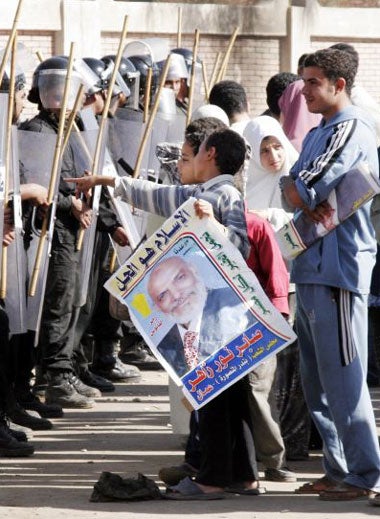Egyptian police fire on opposition voters

Voters fought with riot police, who fired on crowds, killing at least one person, and barred access to polling stations in the third and final round of Egypt's parliamentary elections.
Thousands of would-be voters in strongholds of the banned Muslim Brotherhood, Egypt's largest Islamic party, found their access to polling booths cut off by lines of armed police yesterday, leading to angry confrontations.
In one Nile Delta village, people were so determined to vote that when police blocked the front of the polling station, they went to the back and used ladders to climb over the wall. In Kafr el-Sheik, north of Cairo, police opened fire on a crowd that gathered to vote in the Balteem district, according to witnesses. Gomaa el-Zeftawi, a fisherman, was killed and another 60 were injured. Authorities later confirmed the death of Mr el-Zeftawi, but denied police shot him.
"President Mubarak deceived me. I believed him when he talked about democracy, but look at what is going on," said Hamdi Sayyed, one of hundreds of would-be voters in Sandoub.
Under pressure from Washington to show progress on democratic reforms, President Hosni Mubarak's government allowed opposition groups to campaign in the first two phases of the election. But police interference and intimidation has intensified in later rounds, after the Brotherhood scored large gains, increasing its current representation in parliament by 400 per cent.
A regional expert, Maha Azzam, from the foreign affairs think-tank Chatham House, said the elections were crucial to the whole of the Middle East. "If you open the door slightly, there is bound to be an anti-government backlash. The government was hoping they could please the US while keeping their dominance.
"We're not talking about the ruling NPD losing its dominance, but now the question is whether the violence can be controlled. If it continues, it will lead to chaos," he added. Voting was nominally under the administration of the judiciary, but their control only extended to the bounds of the polling stations. "I know what they [the riot police] are doing, but there's nothing I can do about it," one judiciary official in Bassat, north of Cairo, told Reuters.
The Egyptian Association for the Support of Democracy, an independent monitoring group, said one judge had threatened to walk out of a polling station with the ballot boxes if the police did not admit voters.
Elsewhere, security forces beat up at least four judges posted to monitor voting, and other judges were forced to close their stations because of clashes outside, Hesham el-Bastawisy, a member of a movement of pro-reform judges, said.
The Brotherhood, which had 15 seats in the outgoing parliament, has won 76 of 444 seats so far. The authorities restricted voting in the previous stage of the poll, but the Brotherhood still managed to win 42 seats. The ruling party has 214 seats so far.
Violence has been less serious than in the last polls in 2000, when 10 people were killed. The final two-day stage will decide 136 seats.
An Interior Ministry spokesman, General Ibrahim Hamad, confirmed the killing of Mr el-Zeftawi, the second death since the elections began on 9 November, but said in a ministry statement that polling had "unfolded in a smooth and peaceful manner".
Hundreds of people lined up in front of a school used as a polling station in Sandoub, 75 miles north of Cairo - the hometown of a Brotherhood candidate, Saber Zakher - but they were prevented from approaching by lines of riot police, armed with rifles and tear-gas.
"Where is democracy and freedom? We want to vote but they prevented us," Ibtassam el-Shazli, a Sandoub resident, said. She added that she had intended to vote for the Brotherhood. "We want someone who feels our pain. We are fed up with disease, unemployment and poverty."
Hundreds of security personnel cordoned off several schools in the Sinai town of el-Arish, preventing most voters from entering. Emad el-Bolok, a 35-year-old merchant, said that when police asked who he would vote for, "I said, 'The NDP candidate, of course ... Inside the polling station, the NDP representative told me which name I should choose, but I voted for Abdel Rahman el-Shorbagi [the Brotherhood candidate]."
Subscribe to Independent Premium to bookmark this article
Want to bookmark your favourite articles and stories to read or reference later? Start your Independent Premium subscription today.

Join our commenting forum
Join thought-provoking conversations, follow other Independent readers and see their replies